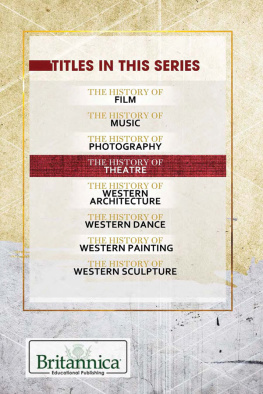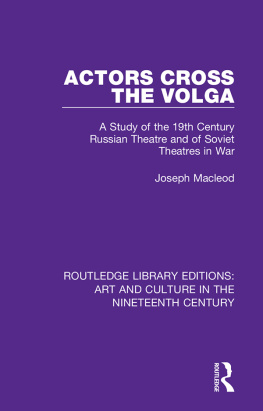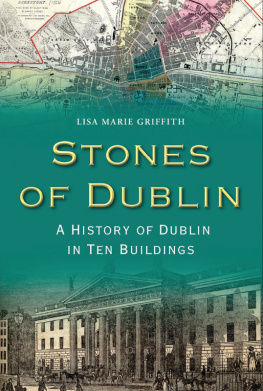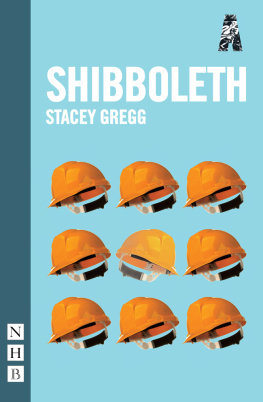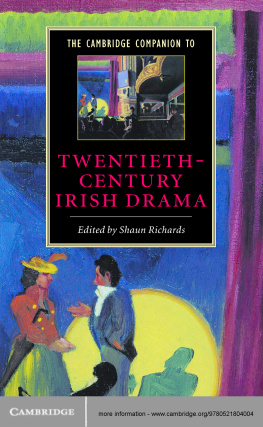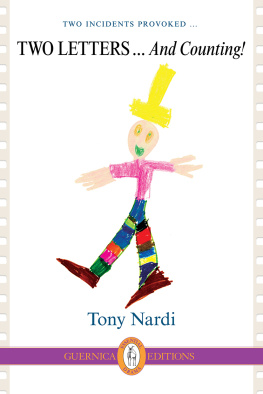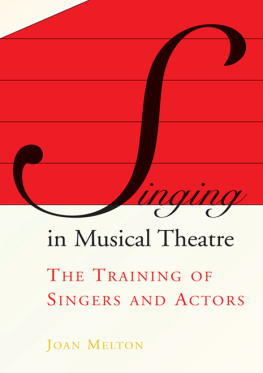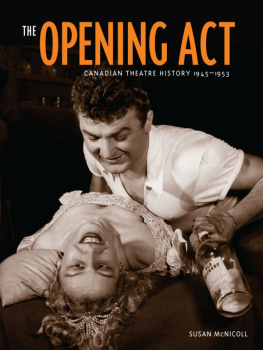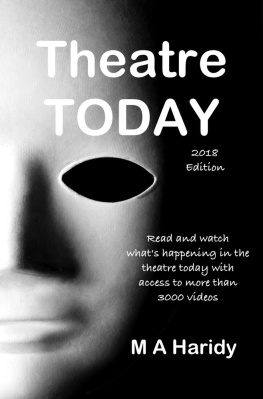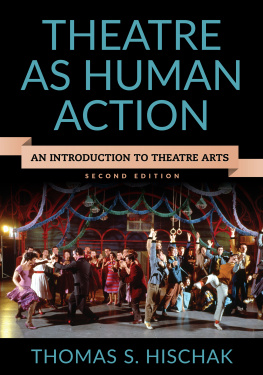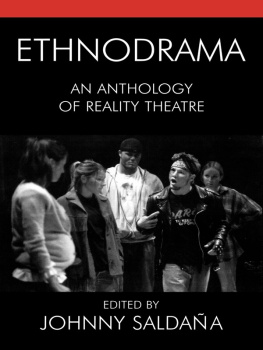North of Nenagh, on the road to Dublin, stands a railway bridge. Forty years ago, driving home after the opening of a John B. Keane play in the Cork Opera House, I reached the bridge and did what I had promised to do for many a day: I turned left onto the road to Cloughjordan. I drove slowly, searching, scanning right and left.
Suddenly, there it was, back from the road, smaller than I had recalled, as places are when reality is superimposed on childhood memory. Not bad, I told myself, to recognise the house where I was born at eight oclock on a Sunday morning in the year of grace 1924, and which, according to family lore, I left before I could walk when the family moved to Nenagh. I stopped and gazed. It felt good to have found my starting point.
Before I set off on this casual memoir of my years in the theatre, I must record that many years later I passed that way again, this time to play in a film shot in Patrick Bergins castle near Cloughjordan. Like looking forward to greeting an old friend, I prepared once more to meet my birthplace. But I found no trace of it. I drove on and back, and on again. The house was gone. A pebble of my life had been swept away.
Long-ago days are yellowing snapshots. Attached to the crossbar of my fathers bicycle is a childs saddle with a backrest and stirrups. So high am I perched that I can see over the hedge into OBriens field. Thats where you were found, my father tells me, under a cabbage leaf. So much for the facts of life.
From the floor I look up at my mother dipping floury hands into a mixing bowl on the kitchen table. Sunlight streaming in from a window at her back casts a halo of light about her. She looks down at me and smiles. I feel secure.
A dog comes to mind. He guards his masters doorway. His owner plays boxing with me. I strike at him. The dog is on me, leaving teeth marks on my stomach. Everyone makes excuses for the dog.
Many years on, visiting Nenagh to direct a play for the local drama group, I put my memory into overdrive and sought the house where I was bitten, and found it with unexpected ease. It was as I remembered, sunlight angling in, a geranium on a windowsill, a wagtail fluttering. I was tempted to knock on the door and ask to see inside. But why? I was thirty years of age and the past had yet no sentimental significance for me.
But a memory had been stirred of peering up and down the street in fear of the bully who might accost me on the way to school. We shared a desk. He prodded me and pinched, and I suffered his torturing until the day he went too far, the day he spat on me. I blew my top, let loose and belted him, right on the conk. A bit of luck. I hadnt aimed, just lashed out. He bled; I walked home with my head held high. I was seven years old.
My father was born in Ballyneal, near New Ross where three counties meet: Kilkenny, Wexford and Waterford. Of his large family I knew only Statia, who lived on the farm, the home place, and much later Philip, when he visited from America. The family were all born well before the end of the 1800s, and the emigrant ship dispersed them to America and England. Emigration was taken for granted as part of Irish life. Young Irish people, working in England, crowded ships and trains on the way home at Christmas, those in America sent cards and money or simply disappeared, whether through indifference or failed fortunes, or worse, none would ever learn.
In the seventies, while adjudicating at a drama festival in New Ross, I resolved to seek out the farm. At the bridge of Ballyneal, memories flooded back. I followed the road uphill as far as a lane on the left, then down the lane past houses scattered on either side, until I reached a farmyard. There was the house, the half-door, the well, the haggard. Had the wheel-bellows survived? In the evening firelight I had turned it when neighbours gathered to welcome my father and chat about this one living with the married sister since the farming got too much for him, and that one dead this couple of years, God rest him.
In the evening the talk turned to the country and the crops, the old days, and the mighty men of yore. And hurling. Always hurling. My father grew up with the GAA. Like many young men of his time the national games gave him a pride in place, an identity and added stature when Kilkenny won a championship. Great players of the past forever strode the pitches of his imagination Sim Walton, Drug Walsh, Matt Gargan, The Graces no more than names to me, but listening to him I almost believed Id seen them play; and once trapped by the legends and the lore there was no question of my allegiance. Kilkenny was my team, then and forever.
In 1931, my father was transferred from Nenagh to Monaghan. Nat Ross, Removals transported our furniture, while the family travelled by train and stayed overnight in Dublin. Mother engaged a horse cab to carry us to the Ormond Hotel, where we would spend the night. On the journey from the station, she explained that Dublin people were small because city air was not as fresh as country air. Barefoot children were the poor, beggars were the poor, as was the woman with the club foot, who dragged a bucket to and from a wayside pump, and the pallid children of Nenagh who must be avoided because they might have head lice or be reeking of TB.
Next day, when Mother was shopping in OConnell Street, a veiled woman, all in black, swept past. Maud Gonne MacBride, she said in awe, in widows weeds until Ireland is set free.
Herself and Robert Emmet, my father scoffed.
On the train north, when we traversed the viaduct at Drogheda, I was held at the window so that I might look down on a mighty river. The Boyne, I was told, that King Billy crossed when a cowardly English king ran away and let the Irish down. Who was King Billy? Who was the cowardly English king? No one explained but I was warned that we were entering the Black North.
Why is it black?
Black Protestants.
Are they black like the black babies I put pennies in a box for the African Missions to convert?
Dont be silly, said a sister.
Theyre waiting for you in Monaghan with cleavers and tomahawks, said another.
Nonsense, said my mother. Protestants are just like us.
They dont go to mass, I said.
They go to church.
If theyre just like us, why dont they go to mass?
Thats enough about it. Read your comic.
A constant complaint of my father was that the Post Office provided no dwelling house for its postmasters. Banks look after their managers but not my crowd. We must fend for ourselves. Which was not easy in the 1930s, a time of economic stress. Vacant houses were few, new houses fewer. When my father was transferred, he was forced to grab whatever was available in any town to which he was posted. In Monaghan what was available was Cappagh Lodge, once the home of long-departed country gentry. Huge beyond our needs, it lay amongst trees three miles outside the town, long, low and white. A terrible barracks of a place, Mother wailed.
A curving, tree-lined avenue led to a gravelled cartilage. The entrance hall, as large as a living-room, was dominated by a marble fireplace at which my father stood, hands clasped behind him, and dreamed of a time of squires and stirrup-cups. Upstairs were echoing bedrooms powdered with fallen plaster and looped with cobwebs. Off the downstairs hall, rooms opened one from the other like Russian dolls. My God, my father mused, it must have cost a fortune to keep up a place like this. Gone now, the family who built it. Or broke. At least they werent burnt out by our national patriots.
Houses such as Cappagh, many in disrepair, dotted the Irish countryside, evidence of the decline of the landlord class, at sea in the young republic, in due course to be ripe subjects for the drama and literature of a new generation. One thinks of Elizabeth Bowens mansion in Bowens Court and Lennox Robinsons


